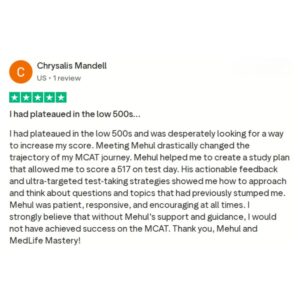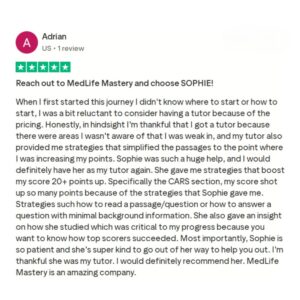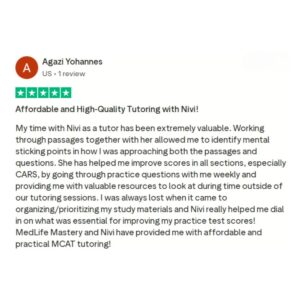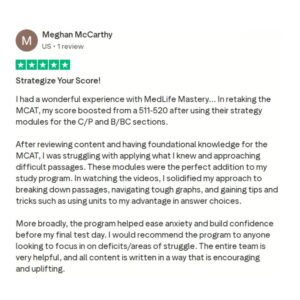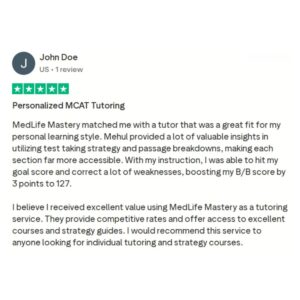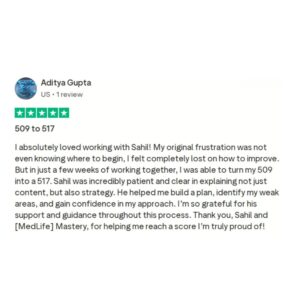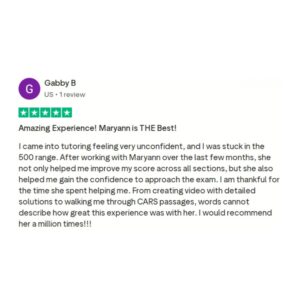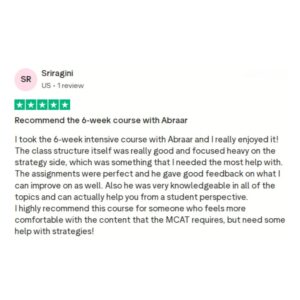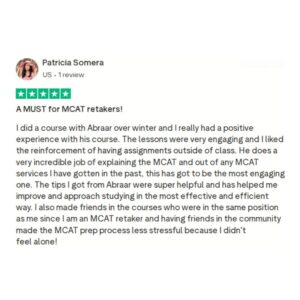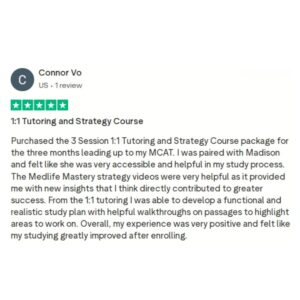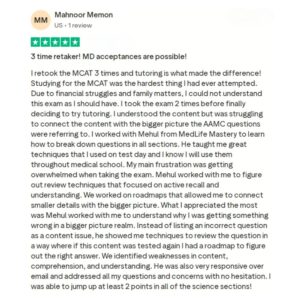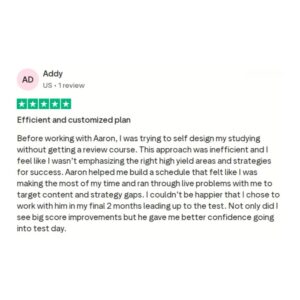Full Interview Transcript
Hello future doctor!
This is Sam and welcome to another episode of the MCAT Master Interview series where it is my job to interview top MCAT scorers and extract their highest-impact MCAT study strategies, their resource recommendations, the inspirational moments, and so much more, so that you can get the most reliable guidance to maximize your own MCAT score.
Today, I have the pleasure of interviewing Troy Dolmetsch.
Troy scored an awesome 512 on the MCAT, but here's where it gets even more impressive. When there was just three and a half weeks left before his MCAT testing day, Troy was scoring a 499.
So he managed to boost his MCAT score by 13 points in less than 30 days. Of course, in this interview we're going to find out what he did to make that happen, and Troy is also currently in med-school so towards the end of this interview, I'll be asking him questions about med-school admissions, so make sure to stick around for that!
More...
Sam: Welcome to the show, Troy. Thanks for joining us.
Troy: Thank you very much for having me, and thank you for the introduction, Sam.
Troy, tell us about yourself!
Yeah, I'd love to say a little bit about myself.
I'm Troy Dolmetsch, a first year med student at Des Moines University College of Osteopathic Medicine. I didn't always plan on being in Iowa. I, myself, am from the state of Michigan, but I have always been interested in the DO pathway, so, that's what makes sense for me. And I guess when you consider the fact that I did my undergrad in Tennessee at East Tennessee State University, I kinda feel like I'm all over and I didn't really found a home in the past few years, but just some things about myself, I'm really into preventative medicine, I am a club president here at school going into next year.
I enjoy working out, I love cooking healthy food, and beyond that I like to listen to podcasts and do a little reading and writing on the side.
Sam: What kind of podcasts do you like listening to?
Troy: I have a mix based on the mood I am in, so if I am hoping to learn something interesting I might listen to Freakonomics or Radiolab is another good one.
What was it that inspired you on this path towards becoming a doctor?
I'm not sure I could say it was any one single event, but definitely a lot of contributing factors. So I would look back on the person I've always been, I've always wanted to aim high, I've always been a decent student and have a love of studying science and related subjects, but to go more anecdotally, when I was kid, I remember one time just playing basketball with my dad and I ended up tripping and falling in a collision and it ended up tearing my dad's meniscus, in his knee.
And actually, from that day, he wasn't mad but he started joking around like "I just hope you go on to be an orthopedic surgeon to fix me one day." Back then I didn't even know the prestige that comes with being an orthopedic surgeon, but that was probably the first time it opened my eyes to the fact that all the bad I do in the world, they could possibly be absolved if I contribute towards that good.
And that was an interesting experience for me and as I got later into college, I was a student athlete there and I just had a couple frustrating experiences with healthcare.
There was one, I had a brain injury related to concussions I sustained and it got me on the sidelines for six months. It was pretty bad for a while and all the visits to sports med physicians and visiting neurologists. I just really wasn't happy with the quality of care received and for me, that was a real ah-ha moment like, yeah, I'm gonna go into medicine and I'm gonna do this right. Now here I am as a first year med student, so...
Sam: Wow, your dad must be proud of you now!
Troy: Yeah, my parents definitely. That's their pride and just how happy they are for me and to see how hard I've worked to get to where I'm at.
If you could describe the MCAT in one word, what would that be and why?
Yeah. For me it's a rather easy answer. The MCAT is mental.
The reason why I say that is some people, they've already failed before they even get into the proctor room and it's really sad. It's just a matter of, they didn't go in with the confidence and, if you don't have that, then you're second-guessing yourself, it stresses you further, it stresses you out more, it's occupying your mental space, you're not being as efficient as possible.
You know, it is super important to study for an adequate amount of time and the methods of how you study is also of super importance, but what I find to be a greater predictor of performance was your mental schema about your own performance heading into exam day.
Just one example there is a good friend of mine here at school and, you know, she's in med school now so she's doing well, but she studied for like two years and she kept pushing back her exam day. That brings on so much unnecessary stress as opposed to if you could commit yourself to "I'm gonna take the exam on this day, I'm gonna do well," and she just never had that sort of encouragement.
Where were you before you began preparing for the MCAT? What was going on in your life at the time? What was your situation in your life at the time?
I'd love to share a little bit about this, I'm not sure anyone else is gonna be in the exact same scenario, but in my undergrad years I was playing Division One NCAA college soccer and I had leadership positions as the President of the Student Athlete Advisory Committee which kinda made me the presidential representative that student-athletes send.
I was also studying an honors Chemistry program, so my hands were rather full in undergrad, at least by my standards, or what I thought was difficult. That didn't leave me any time to prepare for MCAT during my undergrad years, even during my summer as I had internship and chemistry labs and I still had to focus on training for athletics, so it wasn't much of an option for me.
At least for me, I've committed to taking a gap year, but I knew that I would still have to write the MCAT, before or around the time of my applications my senior year.
My original plan was to study in my last semester and take the MCAT the same time I graduated. Unfortunately, I had to produce an undergraduate thesis related to my chemistry research and my thesis ended up taking too much of my study time and actually had to move my date to the summer and I don't wanna lose anyone here, but I was then offered an excellent internship opportunity that I really applied for not even thinking that I would get it.
I was offered the internship at the United States Army Institute of Surgical Research and a part of me almost turned it down even though it was such a great opportunity. I accepted the research opportunity and I said, somehow I'm gonna find a way to work, research almost full-time, and study for MCAT, as well as get my applications in on time. I don't recommend biting off so much at one time, but I did what I had to do.
How long did you dedicate towards MCAT prep?
I would say, about only seven to eight weeks of dedicated study time.
I think my final semester in undergrad, I opened up a book a few times, but nothing really worth contributing and on those seven and eight weeks I feel like the first few weeks were an inefficient use of my study time compared to how I was rocking and rolling those last three and a half, four weeks prior to the exam.
Sam: So you scheduled your MCAT test date, I guess, two months in advance? You thought that would be enough time for you to do well?
Troy: You know, to be honest, I guess when I started studying I was just hoping that I could be average or good enough to get into a school based off my grades and my interview day and whatnot. I was also okay when I was first starting off, you know there's plenty of people who take it twice or multiple times. If this ends up not being my best go-around, I can always repeat it, but I really don't think that's the right mindset to go into it.
Very quickly I realized like studying kinda sucks and this is occupying too much of my time, too much of my mental space to get myself permission to let myself do this all over again. Again that's why I returned to why I said that MCAT is so mental it's because at first I was giving myself the option to fail, but when I removed that possibility from my frame of reference, my studying and my preparation got so much stronger.
I do owe some credit to your program because that three and a half four weeks mark when I made the decision, you know, I can't study like everyone else. I mean, everyone going into med school, they have good grades and good qualifying characteristics, so it's not enough just to study hard, you have to study smart.
That's what I'm really grateful for your program for.
Did you have a goal in mind when you began studying for the MCAT? If you did, how did you come up with it?
That's a good question. I started to allude to it in my previous rant, if you will, but at first I was just hoping for average, just kind of going with the flow and if it didn't go well, I guess I have to re-do it.
But once I kinda reframed my mindset, I told myself "Don't shoot for average, but shoot for something you'd be proud of" so I actually chose 510.
My numbers might be a little off but somewhere around the 80th percentile, something like that. You know I figured it's better to shoot for the moon and still have a chance to land amongst the stars instead of aiming low.
Did you have a med school in mind who needed a particular score for admission or you just aimed for a good score?
Yeah, that was something that I guess was beneficial about, at least considering my applications at the time. I had an idea of what certain schools were looking for. For me, coming from Michigan and being interested in DO. I think, unless you come with a strong school and a consideration for me, I was hoping for like a 507. I guess it might change from year to year, but at the time that was about their average. I knew that I would at least have a fighting chance at most of the schools I was applying to, or at least the schools I was most particularly interested in, if I was a 507 or above.
I guess the other thing that's worth mentioning is a lot of schools want to see that you're average or above average in every section. So it's not enough to have just a great score in one that is overshadowing a poorer score in another because they want to make sure that you have a well-rounded education.
Sam: Right. Exactly. You don't wanna have problem sections sticking out.
Did you have any other challenges or roadblocks, struggles that you experienced throughout your MCAT journey and how did you overcome them?
Troy: Yeah, that's a great question. I think first off, as we talked about being short on time and having a lot of commitments. I don't make excuses for myself, but there's kind of reasonable challenges than something that's very predictable considering all that I was trying to accomplish in a short amount of time.
I guess another challenge I sorta ran into is I wasn't, I didn't really have a great study space. I was no longer at school and just finding an environment that was conducive to studying and I can recreate the test scene on exam day, that was something that was difficult for me, as well as I wasn't really surrounded by other students who had the same short-term goals.
I know I'm in med school now, it's a little bit different, but one of the ways that really helps me learn new information is talking it out with fellow students and I think at least for MCAT, it's hard for me to recreate that, that sort of study group.
Sam: Makes sense. So, would you, when it comes to study groups or studying alone or finding a dedicated study space, do you have any specific recommendations for that?
Troy: You know it's interesting I'm even talking about this because I was always sorta a lone wolf when it came to studying. Even when I started med school I thought it was something I would have to uphold just to do well, but you know, exploring new ways of learning information and kind of really focusing on your weaknesses with others, because where you may be weak, others may be proficient. And if you are proficient and you can try and take the time to try and teach that information to someone else, it'll stick so well in your brain and basically never forget it.
But yeah, we also talked a little bit about study space. Just finding somewhere quiet and I would get on a lot of students listening to this, just limit your distractions like really. Even having your phone out on the desk with you is enough to occupy some mental space that distracts you, so... when I'm on dedicated studying time I turn it on airplane mode or I leave it in a different room somewhere. I just even don't wanna think about it.
You know, some people can listen to music, if that works for you that's fine, I guess. I tend to think that lyrical music doesn't really work for me. You can go to YouTube though and put on a white noise video, or like specific videos they say will enhance your concentration. Those things work well for me, if you balance it enough. Yeah.
Sam: Yeah, me too.
Troy: Yeah, those are some of my tips on study space and environment.
Sam: And now I have to ask you this because a lot of our students are in similar situations whether they have full-time jobs or... just a lot of things on their plate, just like how you did. But a lot of times they ask how they should schedule their MCAT prep while maintaining all of these extra-curricular and work responsibilities. So, what was your schedule like?
With having a job during your MCAT review, what was your schedule like?
That's a great question, thank you for asking. I would say, when I was preparing to write the MCAT, it was probably the best circadian rhythm I've ever been in.
To give you a taste of what a day was like, I'd probably go to bed at around 9 p.m., wake up around 4:50 and drive to where I was working. I'd work out in the morning and get showered and just walk in to work around like 7:30, granted I was working at an army base at the time, so everything was a little bit earlier in the day.
Sometimes if I chose not to work out in the morning, I'd still try and keep this routine the same so I'd get up early and maybe start studying.
It's really surprising how productive you can be in the morning and rested and you know it's maybe quiet in the house and no one else is up.
It's really good for a productive flow state. After my morning was over, I would work about 8 hours and I was lucky enough to point that I was doing research, but sometimes when you're doing bench research, it's a matter of setting up an experiment and waiting until you can collect the data.
So I found pockets of time, you know, thirty minutes to an hour of work where I could get in studying and it didn't distract from my work at all. I know it's not the case for everyone, but if you want to steal these little micro-sessions to make the most of your time, just look for those opportunities and then after a day of working I would go home and study, or hurry to a library.
One other tip that can maximize your study time is, you know, after a few hours it may feel saturated learning a subject. When I was in school, I can only do Bio-Chem for 2 or 3 hours and then I feel like mentally exhausted because those neurosynapses in my brain, the network that is tied to my biochemistry knowledge is kind of overloaded, so if I start studying anatomy, then it's a whole different circuitry and kind of re-energizes me.
Sam: You sound, to be honest, very disciplined. Being able to sleep by 9 p.m. everyday... I've tried it and it's probably one of the hardest things to do and I know what you're saying that when you actually can do it that when you sleep early and wake up early, productivity just goes through the roof.
Troy: Yeah, I appreciate you saying that. I just kind of laughed at the moments we've been talking, you could already pick up on that because I think anyone of my friends and family, that would be the one thing they can say about me, it's just discipline. So for me that's why I could do my own MCAT studying and I didn't rely on a course. I was kind of really turned off by these courses because they were an extra commitment whereas I feel like I could manage my time better if I'd set my own schedules and also saved myself the money paying for one of the really expensive courses.
Was 499 the lower score that you ever got or did you get a score lower than that?
I actually got 498 on my very first practice. That was humbling. Even though it was very early in my exam prep, again, that's when I started to realize like, "Oh, shoot." You know I was a good student before, but now everyone who's writing this exam is also a good student.
Sam: Yes. Okay, so, to get the picture right. You got a 498 and then I think you were less than a month away from your actual test day, you just got a one-point score increase like you got a 499 at that point.
Troy: That is accurate, yes.
Sam: Okay, so here's one of the biggest questions now. How did you manage to just skyrocket your score from that 499 to a 512 in just three weeks?
How did you manage to just skyrocket your score from that 499 to a 512 in just three weeks?
Yeah. So again, another humbling experience, I think. Getting a 499 a month later, that was probably worse than the 498 just because I actually invested time and, you know, I felt like going into that second practice exam that I'd learned some information and I should be able to do better and have, hopefully, better strategies but I really didn't.
So when I got that 499, I took a step back. For a few days afterwards, I didn't really want to study in the sense that I had been, but that's when I find you guys' program and I told myself, you know I'm not gonna continue studying this way because something clearly needs to change.
So I binge-read your program even though you said not to, but I was short. You know I was able to take the strategies with me. It wasn't like the time I had spent before the MedLife Mastery program was wasted, I just kind of had to rework the information and I just took on some new strategies and that's where I got to where I was at.
What was your most impactful strategy that you used?
Yeah, of course I'm not gonna give away all the strategy, but you guys definitely had some good ones in there like things you tied into lifestyle... some of the other stuff, oh man, it was just so good. Especially the ones about actual MCAT exam day, like how to use your time when you go on through the tutorial, I thought that was genius and I think the one that really helped my studying the most is I started to keep a notebook of all the mistakes I would make on practice questions.
What I had to do with myself is when I would get an answer wrong, I would have to, in hindsight, look at why the correct answer is correct, write it out with a pen, explain it to myself so that I would stop repeating the same mistakes. And so that notebook with all the wrong answers that I've got, over the course of all my practice questions, actually became one of my best study resources.
Did you have any other materials and resources that you used during your MCAT prep that you recommend?
Yeah, so let's start off. I kind of alluded to the fact that I'm disciplined and structured class wasn't for me, so I wanted was something more that I can control the pace that I worked at, so I purchased Kaplan MCAT review books and for the most part that was my best study resource, minus the formal education I had in my undergrad years.
The MCAT review books by Kaplan, they're good enough and I thought during the practice questions after each section was a good way to make sure I was understanding things, but I would also supplement with videos on YouTube or Khan Academy. I would use free practice questions available on the internet, just Googling "free MCAT questions" and I really was trying to do it as cost-effective as I could. There were some really good resources that I found readily available.
Your highest scores were in Bio/Biochem and Psych/Soc, how did you study for those sections?
So at the time I was fresh off of taking Biochemistry in school and I thought that was extremely helpful. For me, I would recommend the quickest way to boost your Biochem score would be, to just be rock solid on your amino acid structures and properties.
I think a lot of questions just want you to discern whether amino acids are polar or hydrophobic or acidic or basic. Understanding those, I thought that was just a real easy hack.
Also I would recommend just the enzyme sequence and the enzymatic pathways, if you understood the steps of the [inaudible 27:31] and the citric acid, acid cycle, I thought those were real handy old concepts on exam day.
And for the Psych/Soc, as a Chemistry major I placed a lot of focus there because it was not as extensive in my formal education as a Chemistry major.
That just brings me back to taking time to focus on your weaknesses, understand where you may be deficient and really dedicate yourself. So what worked well is I also found this section especially conducive to reviewing concepts in my head that didn't require formal study time. For instance, I think I'm on your guys' website and authored a testimony on your page talking about how I can concoct scenarios in my head that can address the psychosocial concepts. For instance, I could talk about making a decision and using my frontal cortex, because it's like the higher executive functioning, you know. I can see two animals playing on the side of the road and think about game theory.
It's kind of annoying that MCAT just kind of becomes your life for a little bit but it was also something kind of enjoyable about it. So I thought that it was really great to practice my PsychSoc at any given time of the day. There were also a couple of common steps that I found challenging but could be high yield on exam day, so at least the ones that stick out to me are. I know game theory was tested and I don't know if that's what's covered in most pre-med undergraduate curriculum.
Another one that stuck out to me was the optic field of vision. I'm just looking at my notes right now and I don't understand why that falls into PsychSoc, but it's good, but anyways, those are my suggestions.
It also looks like Chem/Phys was your weakest section on the other hand. Can you shed some light on that? What happened? And do you have any advice for students struggling with that section of the MCAT and what would you have done differently?
I'm glad you asked this question. To anyone listening who has yet to write MCAT and yet to go on interviews; interviewers on your med school interview day love to address your weak points, so they'll ask about classes you didn't do the greatest in or perhaps sections with MCAT you were not strong in, so there's something for listeners to keep in mind to kind of embrace your weaknesses.
To answer your question, in short is because I had limited time and in a desperation move, I chose not to focus on Chemistry that much because my undergrad concentration was in Chemistry and I was hoping that was already a strength of mine and wouldn't need much polishing.
Obviously that assumption was kind of a mistake because when you're studying for the MCAT, you're using resources that are MCAT specific. The chemistry that I was doing during my junior and senior years were upper-level chemistry, physical chemistry, advanced and organic chemistry, you know, that's great but they weren't applicable to MCAT day because they were so far beyond the scope of what was tested. And what was tested was basic chemistry and basic physics that I had 3 years ago in my freshmen classes because I was on the fast track to a chem degree.
Just being so far removed from those basic classes and not taking enough time to review would be my explanation of why that was my low.
Did you ever consider re-taking the MCAT to balance your scores out?
I did not. I mentioned earlier that 510 as a total score is what I was shooting for. I could have improved Chem/Phys but I felt confident enough in my overall application profile.
You know, if that question ever did come up in the interview, I could explain just as I did to you, that I do feel that I have a strong chemistry and physics background even though my exam score didn't reflect it. Confident enough that I could handle any sort of difficult questions on interview day.
If chemistry and physics is not your high score, for students out there. You go into your interview day and say, "Hey I started working in a chemistry research lab," you know, "I really feel my exam score doesn't reflect my understanding of the subject." You do have a good chance of avoiding any conflicts in the admissions process if you can prove that you are sufficient in all subjects.
Do you remember how you felt the morning of your exam? How did you deal with any anxiety, if there was any, during test day?
Another good question.
I don't think anxiety was ever overwhelming for me during the process even though it easily could have been. I easily could have been overwhelmed about what was at stake, but just returning to that mindfulness and the visualization aspects of being a confident exam-taker really paid off.
So not a ton of anxiety going through the process, but the night before the exam, I've thrown off any sort of studying. I figured, "You know what you know at this point," and cramming might just do more harm than good if I'm gonna stress myself out.
So I just relaxed with a nice dinner and a TV show I'd seen a thousand times and got some good sleep. I woke up ready and calm. One thing that helped is, you know, I marked this day on my calendar and I would make sure that I would look at that day on the calendar everyday just so it wasn't sneaking up on me and I can kind of visualize myself on that day, everyday approaching that.
I really felt ready and calm. I woke up in plenty of time to get there which was a really smart move because I was having fog issues in the inside of my car and I actually had to pull over on the expressway to get there. So that was the morning of the exam.
I was surprisingly calm, all things considered, and one thing that, again from your program that was really valuable is, you know, I had taken the day off of work the day before just to make the practice drive to the proctor site and it's a good thing I did because the day that I went out there just as a practice drive to see how much time I would need and to make sure that there's no, nothing, no incidences that could distract from my mental space on exam day.
When I went out there on my practice day, I couldn't find the proctor site and it probably took me close to an hour just, like, driving around on my practice day and I was so thankful that it wasn't the actual exam day. Otherwise, I could have been late or I would have occupied all my mental space going into it.
Were you scoring around a 512 a few days before your test date or was that like a surprisingly high score or a lower score than you expected?
Yeah, so the 499 that I got a couple weeks before the exam day, that was the last full-length practice that I did. What I did in between those, I would take sectional exams at a time and it was getting to a point, approaching exam day, where I would take these questions and I was only missing like one, two, three questions and I was doing much better.
I don't have a MCAT equatable score to give you but I was doing much better and when it came to actual exam day, I felt more confident in my answers and I didn't feel lost in the details of a question. I just feel like I had more direction on how to approach each question, so definitely had a higher confidence going into the exam room.
If there is someone who is studying for the MCAT and is feeling burnt out right now, or frustrated, sad, anything of that nature, what would you say to them as like an older brother or like a mentor?
Yeah, so glad you brought this up. To that person listening, I would just tell you that you're not alone. No one wants to be feeling the way that you are and unfortunately for us MCAT takers, it's very common.
I would just stress that your worth as a person is not tied to the score you've been getting, so please do not lose yourself when studying. I hope you can maintain the habits that make you you. I hope that if you're burned out, you can find some healthy outlets, I recommend exercise, socialization with friends and family, that's key.
Mindfulness and meditation goes a long way. That's really what comes to it, you know. Don't be afraid to take a few days off to recharge. Feeling bogged down like that occupies a lot of your mental energy and it's not an efficient way to study in that mindset.
If you are feeling burned out, I would, you know, I don't want you to lose track of the goals that are in sight because you can get there and you can do this. It's just a matter of reminding yourself that you can do it and hopefully adapting some healthy practices that will make it a better experience moving forward.
Mental health is super important, so if anyone who's listening to this is struggling, please don't be afraid to reach out to someone. There's people who care about you and people who would really help you if you need it.
Did you have any regrets at all during your preparation that you would have done differently?
Yeah, really great question.
I don't think I have regrets, but did I do it perfectly? No. I really can't change the outcome and I'm thankful that my experience has gotten me to the point where I'm at and you know I kind of liken the analogy of taking the MCAT, it's almost similar to starting a family, I imagine. I don't have a spouse or a child or anything, but there's never a convenient time, is the point to be made there. If there ever was an ideal convenient time in my life that I can dedicate months of studying, you know, that would have been great but it's just not how life was going.
Additionally, another reason why I don't have regrets is that it's so easy to get lost in studying if it is the only thing that you're doing. I'm almost appreciative of the fact that I had work and applications to work on, and so sometimes I could take my mind off of studying. I'm not recommending other people to take on the same workload, but it doesn't require just pure dedicated studying to prepare for the MCAT. In short, no regrets.
You're in med school and there are so many students who are listening to this, who are hoping to be in your shoes soon. What is it like knowing that you're on your way to becoming a doctor?
You know, med school, it's great. It's always what I wanted to study. With medicine there is no more doing busy work or taking classes that you won't need one day. I also think it's really fulfilling to be surrounded by like-minded students who have similar goals and who similarly worked hard to get here.
Now that I'm here, it's crazy how fast it's going by. In a few weeks, I'll be a second year which means board's becoming my newest obstacle, so that's... if you ever make a board study program, let me know.
Med school is a lot of work, it's honestly quite easy to get overwhelmed by the amount of studying that's required, so if I can give advice to listeners for when they do get to med school because they will do great on their MCAT and get to this point, you know...
Med school kind of feels a lot like studying for the MCAT, the only thing is like, med school isn't so temporary so again it's just important not to get overwhelmed.
Just remember that you're you and, you know, that your classmates work hard and they might have different methods for studying and that doesn't mean that your way is wrong and just because you take time to talk to your family or friends doesn't mean you're not studying enough.
I would just really try and focus the listeners to focus on their wellness sooner rather than later, and hopefully carry some healthy habits for when they are in med school.
Our school, especially, talks about the research with physicians who experience the symptoms of burnout and how those physicians are giving low quality care to our patient, so that's just some... you know, maintain wellness.
What is super rewarding for me, because I am in my pre-clinical years, in some schools it may be different. In some schools, you make it in the clinics and start getting experience almost right away. In the pre-clinical years it's very heavy on the foundational classes and even though you're in med school, you kind of almost forget the end goal is to become a doctor that is interacting with patients and treating them.
So I get a lot of fulfillment out of volunteering, working free clinics, and visiting a nursing home, just kind of getting that reminder that my sense of service is strong and that's why I'm in this career.
Do you look at the MCAT now and have a different kind of perspective on it compared to the exams now that you're in med school? What's your perspective on the MCAT now?
Yeah, that's a funny question, I don't think the MCAT intimidates me nearly as much as a year in med school. The exams in med school, they are challenging but fortunately they are not 8 hours long.
Do you have any more tips for the med school admission process?
Yeah. So the med school application process is just that. It's a process. Once you send in your applications, it's a lot of waiting around which can be frustrating not to have any feedback or direction.
Additionally, I'll stress that the application process consumes your time, your money, and your energy. I mean, it takes time to write essays and fill out your profile and each school that you apply is gonna ask for your application fee. I mean, your energy is not a finite resource and you want to find the balance that you complete enough apps, that you have an optimal chance at admission at a school that you want to attend. Just finding the balance of limiting your schools so that your time, money, and energy is not just being carelessly thrown out.
Those are my tips about the application process.
In terms of writing essays, the best advice I could give someone is one, tell the truth. Don't try to tell a story that is not you because the people who read those essays and the interviewers will see right through that. So tell the truth of who you are and don't be a perfectionist when it comes to writing your essay, so what I think gives people a lot of intimidation is they start drafting an essay and it doesn't read perfectly how they want it to sound, so they just get caught up in editing the same sentence over and over and they don't make any progress. So really focus on your writing skills.
There's a couple of podcasts out there or YouTube videos that might help with this, but when it comes to writing essays, get all your information down and all the points that you wanna hit and then it's just fine-tuning your essay over and over.
Like, you should spend twice the amount of time at least editing, as you do actually writing. The perfect way to share your essays is [inaudible 47:56] have them look it over. Someone will always find something that your consciousness doesn't pick up.
That's writing essays and the application process and, interview day, again, just tell the truth and look nice. Be well-groomed. And have a smile on your face. I guess, when it comes to interviews, a lot of students might be uncomfortable in one-on-one situations. They get rather intense, especially if you've never been in a situation like that before, so I would honestly urge students out there to start getting comfortable in situations like that.
Seek out one-on-one conversations and be very intentional and get comfortable talking about yourself because a lot of students cannot do that. I'm on a rant right now, but if you're still an undergrad and you have access to a student counselling center, that is a perfect way to start honing in on your interview skills because it gets you in a one-on-one situation and it forces you to talk about yourself.
What are your plans for the short and long term future? What's your vision for where you want to be, what's that picture looking like five or ten years from now?
Thank you for that last question.
In the short term, all you can do in med school is take it one day at a time, so I hope to finish the semester in the best way that I can. I have some leadership and some extra-curricular groups here at school, so I wanna come up with some cool things that we can accomplish as a club in the next year.
This summer I'm gonna start studying for boards, because, you know I made the mistake once when I was taking the MCAT by not giving myself adequate time and so I'm starting earlier and I don't wanna feel rushed when boards prep come around, so that's short term. And five to ten years from now, depending on the time point, I could do a residency or maybe a fully-licensed position, so I'm keeping an open mind for specialties I go into but I'm finding that knowing and seeing all disease presentation to me is more appealing than singularly focusing in one area, so I'm partial to opportunities related to internal medicine or family medicine. You know, we'll see. I need more exposure in [inaudible 50:47 - 50:50]. A lot to look forward to.
Sam: Yeah, for sure, that sounds great. This has been absolutely amazing. You've given us an abundance of great insights and I really appreciate. Thank you again and we wish you all the best on your journey to your vision and for becoming a doctor.
Troy: Thank you so much, Sam. Thank you for having me on. To everyone who listens, thank you for your attention and I wish you the best of luck, I know you can do great.
Sam: Hey, this is Sam again and if you liked this interview, be sure to subscribe and also join our free MCAT strategy email course.
When you join, you'll get a new top scorer insight once a day that you can apply to your MCAT prep right away to increase your score.
And before you go, I just wanted to highlight the importance of mindset and how it's absolutely essential to take care of your mentality during MCAT prep if you want to get a great score.
Unfortunately, the MCAT has its way of triggering extreme anxiety and low confidence whether it's because of plateauing scores, declining scores, the pressure to do well, to get acceptance, or just from the sheer amount of content that you need to learn.
It can be tough to stay positive throughout so I hope these interviews show you that there were others like you who experienced similar doubts and frustrations, but made it out a success and are now on their way to becoming doctors.
And it's important to know that they made it out a success because they understood that the MCAT needs to be approached with smart strategies because it's not like the normal college exam that you're used to, so you can't study for it like you normally would.
We've realized this secret commonality among top scorers after years of researching and conducting these interviews. Like he mentioned, when Troy's score stalled at a 499, which was just a one-point score increase after a month of studying, Troy used the MCAT strategies and followed the program in our MCAT strategy guide and increased his score by thirteen points in the last 3 and a half weeks before testing.
So if you have a similar struggle or if you just want to know the most smartest, easiest, and the most efficient way to prep for the MCAT, we've linked to those strategies and MCAT Strategy Resources here.
Lastly, thanks for reading, we hope you enjoyed this, we'll catch you on the next interview. Good luck with your MCAT prep.
You got this!
Additional Reading -- MCAT Success Stories:
- How Jennifer Increased Her MCAT Score By 10 Points In Less Than 30 Days
- A 17-Point MCAT Score Increase: 496 to 513! (ft. Stephanie Hayes)
- From 490 To 511 On The MCAT: His 21 Point Score Increase
- Siraj’s 3-Month 523 MCAT Study Plan As A Full-Time Student
- From 485-495 Plateau + 4 MCAT Attempts To 514 (1.5 Years Later!)
- 41-Year-Old Accountant and Father Dominates The MCAT With a 520!
- Noah’s MCAT Success Story: From 496 To 510 On The MCAT In Less Than 30 Days!
- 19 Point MCAT Score Increase In 6 Weeks While Working Full Time
- From 500 Plateau to 516 in Less than 30 Days (ft. Abbi Shrontz)
- How I Went From 500 To 513 on the MCAT In 4 Weeks
- From 501 Plateau To 513 On The MCAT
- Melissa's MCAT Scores Kept Going Down, But She Didn’t Give Up
- How Tanmay Scored 514 On The MCAT In Just 3 Months!
- How Peter Went From 499 To 513 On The MCAT In 8 Weeks
- From 494 (2015) to 502 (2019) to 513 on the MCAT (ft. Jennifer Nagel)
- From 498 To 514 WITH A Busy Schedule!
- From 499 To 511 In 4 Weeks On MCAT Retake!
- From 500 To 512 (Exact Goal Score) In 30 Days!
- From 500 To 514 On The MCAT (2.5 Years Later)
- From 501 To 514 In The LAST 2 WEEKS Before The MCAT!
- From 64th Percentile To 98th Percentile On The MCAT In Less Than 30 Days
- How Kayla Scored 131 In Psych/Soc on the MCAT
- How He Increased His MCAT Score From 499 To 512 In 3 Weeks
- From 489 To 509: How She Improved Her MCAT Score By 20 Points
- 6 Point Score Increase In the Last Week Before the MCAT
- How Melanie Increased Her MCAT Score By 12 Points (From 505 to 517)
- Interview with a 519 Scorer, Re-Taker, and MS1: Julia Meguro
- MCAT Master Interview With A 100th Percentile Scorer: Priya Swaminathan
- Best MCAT Bio/Biochem Strategies – Top Tips From A 131 Scorer
- From 499 To 515 On The MCAT In 7 Weeks!
- Hope’s MCAT Retake Story: I Went From 500 to 514 In 6 Weeks!
- How Oleksandra Retook The MCAT and Scored 510
- How Suman Scored Over 510 The Second Time
- From 503/505 To 511 In The FINAL 2 Weeks!
- How Sara Scored 522 On The MCAT
- Taylor's Secret To Scoring 131 On CARS and 511 on the MCAT
- Tara’s MCAT Study Advice Based On Her 510 MCAT Score
- Jenny's Motivational MCAT Success Story: From 499 To 511 In 3 Weeks?!
- A Non-Traditional Applicant’s 514 (91st Percentile)
- How Lindsay Scored 513 On The MCAT While Working Two Jobs
- How Morgan Improved Her MCAT Score From 498 To 511 While Working Full Time
- 10-Point MCAT Score Jump in 2 Weeks: From 503 to 513!
- Can You Have A Social Life During MCAT Prep? (ft. two 515+ scorers!)


 To help you achieve your goal MCAT score, we take turns hosting these
To help you achieve your goal MCAT score, we take turns hosting these 

